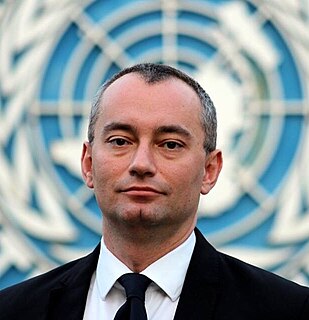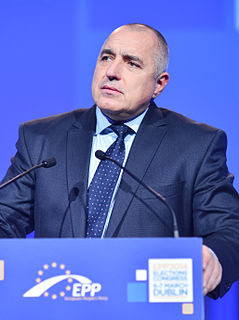
The politics of Bulgaria take place in a framework of a parliamentary representative democratic republic, whereby the Prime minister is the head of government, and of a multi-party system. Executive power is exercised by the government. Legislative power is vested in both the government and the National Assembly. The Judiciary is independent of the executive and the legislature.

Bulgaria elected its members of the European Parliament in a by-election on 20 May 2007. It was the country's first European election, having joined the Union on 1 January of that year. The country still had 18 MEPs, no change from before the election. Until Bulgaria could hold these elections, the country was represented by MEPs appointed by the National Assembly.

Parliamentary elections were held in Bulgaria on 5 July 2009. With 40% of the vote, the decisive winner of the elections was the established in 2006 personalistic party of Boyko Borisov - GERB. The Socialist Party, in power before the election, was in second place, with around 18%. Оnce-ruling National Movement Simeon II did not cross the 4% threshold and won no seats. The turnout was 60.2%, one of the lowest ever. Following the election, GERB leader Boyko Borisov became Prime Minister. Just like all the previous parliamentary elections since the fall of communism, the government was not re-elected.

Tsetska Tsacheva Dangovska is a Bulgarian jurist and GERB politician who is the current Minister of Justice of Bulgaria as part of the Third Borisov Government, having assumed office on 4 May 2017. She had previously held the position of Chairwoman of the National Assembly of Bulgaria on two occasions. Tsetska Tsacheva is the first woman to ever chair the National Assembly of Bulgaria since its establishment in 1878.

Rosen Asenov Plevneliev is a Bulgarian politician who was the 4th President of Bulgaria from January 2012 to January 2017. He was the Minister of Regional Development and Public Works from July 2009 to September 2011 as part of the cabinet of Boyko Borisov. In October 2011, Plevneliev was elected as President in a second round of voting; he was inaugurated on 18 January 2012.

Iliana Malinova Iotova is a Bulgarian politician who has served as Vice President of Bulgaria since 2017. She was the running mate of Rumen Radev, who defeated GERB nominee Tsetska Tsacheva in the second round of the 2016 presidential election. She was a Member of the European Parliament from 2007 until her resignation on 16 January 2017. In the EP she sat on the Committee on the Internal Market and Consumer Protection and was a substitute for the Committee on Civil Liberties, Justice and Home Affairs. She also participated in the Progressive Alliance of Socialists and Democrats in the European Parliament. She speaks Bulgarian, French and English.

Parliamentary elections were held in Bulgaria on 12 May 2013, two months ahead of schedule. Protests had forced the resignation of the GERB government in February, leading to the election being moved up.

The European Parliament election of 2014 in Bulgaria was held on 25 May 2014 to elect the Members of the European Parliament from Bulgaria to the European Parliament as part of the larger European Parliament election. After a decision by the European Council in 2013, Bulgaria was allocated 17 seats in the European Parliament for the Eighth European Parliament.
The Oresharski Government was the eighty-ninth cabinet of Bulgaria which took office on 29 May 2013. The government, led by Prime Minister Plamen Oresharski, is one of technocrats created following the 2013 election. The cabinet was dissolved on 6 August 2014 to make way for a caretaker government that would lead Bulgaria through early elections in October of the same year.

Boyko Metodiev Borisov is a Bulgarian politician who has been serving as the 50th Prime Minister of Bulgaria since 4 May 2017. He had previously held the post of Prime Minister on two separate occasions, from 2009 until 2013 and from 2014 until January 2017. He was also the Mayor of Sofia from 2005 to 2009.

A referendum on introducing electronic voting was held in Bulgaria on 25 October 2015 alongside local elections. Although the referendum resulted was approved by a wide margin, turnout was far below the required threshold to make its result binding.

Parliamentary elections were held in Bulgaria on 5 October 2014 to elect the 43rd National Assembly. GERB remained the largest party, winning 84 of the 240 seats with around a third of the vote. A total of eight parties won seats, the first time since the beginning of democratic elections in 1990 that more than seven parties entered parliament. Boyko Borisov then became prime minister as head of a coalition with the Reformist Bloc and with outside support from the Patriotic Front and the Alternative for Bulgarian Revival.
The Alternative for Bulgarian Revival is a centre-left political party in Bulgaria. The party's initials in Bulgarian, 'АБВ', are the first three letters of the Cyrillic alphabet, equivalent to 'ABC'.

The ninety-first Cabinet of Bulgaria took office on November 7, 2014. It is a coalition government chaired by Boyko Borisov. The government was formed after the Borisov's party, GERB, won the 2014 parliamentary election. As GERB won 84 out of the 240 seats in the National Assembly, they were compelled to form a coalition to legally govern.

Presidential elections were held in Bulgaria on 6 November 2016, alongside a referendum on changes to the electoral system and political party funding. The second round was held on 13 November 2016, resulting in the victory of Rumen Radev.
Traycho Dimitrov Traykov is a Bulgarian politician. He was a Bulgarian Minister of Economy and Energy from 2009 to 2012. In February 2012 he launched an examination of dams in the south of the country after malfunction complaints. In March 2012 it was reported that he had been dismissed from his position allegedly for delaying work on energy projects; Bulgarian-language daily Bulgaria Dnes alleges that it was due to Belene Nuclear Power Plant specifically, a project which was terminated that month. Traykov himself "attributed the dismissal to his firm position in negotiations with Russia and his demands that Russia should cut the construction cost of the Belene plant, reduce gas prices by as much as 15 percent in a new supply contract and increase returns from the South Stream pipeline above 8 percent." He was succeeded by his former deputy, Delyan Dobrev.
Yes, Bulgaria!, is a Bulgarian political party, founded in January 2017 by former Minister of Justice Hristo Ivanov.
Presidential elections are scheduled to be held in Bulgaria in 2021, although they may be held earlier if the office of President become vacated as a result of death, resignation or removal from office. The incumbent president, Rumen Radev, is eligible for re-election.


















